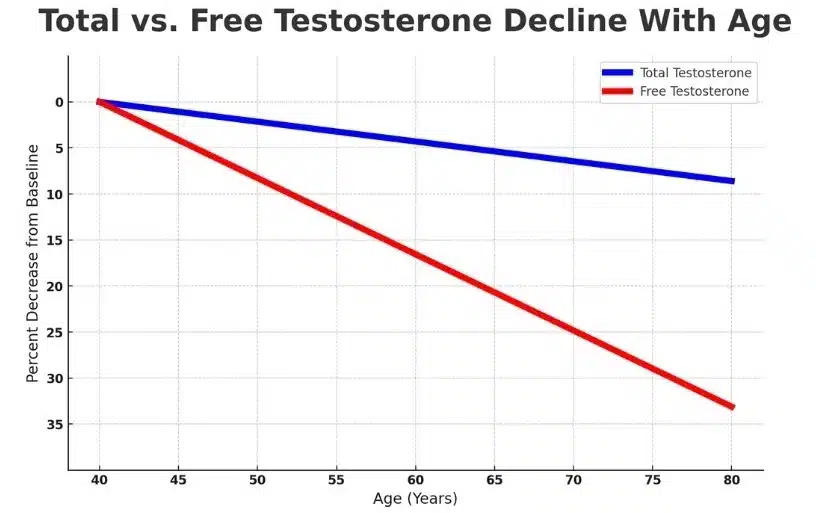Health Habits to Boost Testosterone
Low testosterone isn’t just about libido (sex drive). While it’s one of the symptoms that bring clients in, you may also experience: fatigue, reduced muscle mass, increased body fat, depression, poor sleep, and brain fog.
Testosterone levels decline with age naturally, but there are ways to slow and even possibly reverse the testosterone decline.

5 Ways to Help Your Testosterone Levels
1. Improve Your Diet
Changing your diet to be more whole foods not only helps promote weight loss and healthy weight gain (muscle), but it promotes healthy hormone production. Men who are considered overweight or obese have a much higher likelihood of low testosterone and higher levels of estrogen, this process is call aromatase, which converts testosterone into estradiol. This in turn lowers a man’s total and free testosterone levels.
A good diet includes fruits, vegetables, whole-grain carbs and lean proteins such as chicken, fish, lean beef, and turkey. Put simpler, avoid refined, simple carbohydrates and junk food, including sugar. This will ensure your body has the tools to run efficiently, in turn spiking testosterone levels.
2. Exercise
Exercise not only produces overall health benefits, but can help you lose weight and reduce body fat. Adding exercise, particularly strength training, into your routine can drastically increase testosterone and muscle mass.
Cardio is a great way to burn a lot of calories, while the muscle built from strength training can help boost your overall metabolism so that you’re burning calories even when you’re not exercising. Plus, both types of exercise — strength training, especially — can help you rebuild some of the muscle mass you might have lost as a result of low testosterone.
Whether you’re new to exercise or just getting back into it, know that everyone’s fitness level varies and the best way for you to burn calories may look different than the guy on the treadmill next to you. Cardio can be a long run, but it can also be walking at a brisk pace.
And, if you’re new to strength training, don’t be intimidated. Try starting with body weight exercises, which are movements that rely on your own body weight to help build total body strength — no gym membership needed.
We lead busy lives, and it’s easy to treat exercise as an afterthought. Either we don’t consistently make time for it in the first place, or we find a specific type of exercise we enjoy and put it on repeat. But making time both cardio and strength training in your weekly workout routine gives you your best shot at boosting your testosterone levels.
3. Sleep
Sleep matters. Getting an adequate amount of sleep every night is important for maintaining overall good health, which likely promotes sufficient testosterone levels in general. But it’s actually more than that.
Most testosterone release happens while you’re sleeping, meaning that sleep has a direct effect on your testosterone levels. Data show that getting less than eight hours of sleep can reduce a man’s testosterone levels by as much as 15% the next day.
So, while 4 to 5 hours of sleep may seem like enough to get you through the day, it could be contributing to lower levels of testosterone.
4. Reduce Stress
Like sleep, stress affects your entire well-being — including your testosterone levels.
When you experience stress, your body releases a hormone called cortisol. This hormone helps your body prepare and respond to this stress, and then your body goes back to normal. But when you’re stressed more often than not (chronic stress), you experience prolonged exposure to cortisol — and studies show that cortisol circulating in the bloodstream reduces the level of free testosterone.
And while life is always going to be stressful, you can take steps to reduce stress you may be feeling.
One of the best ways to relieve stress is to take time for yourself and do something you enjoy — even if it’s only for a few minutes every day. It could also mean actually acting upon those deep-breathing reminders that your smartwatch keeps bugging you about. Just something to get you to slow down, be present and relax your mind and body.
And if you’re stress is stemming from your low testosterone level itself, seeing Mantality could determine if that correlates.
5. Verify No Underlying Medical Conditions
Something many may don’t realize is that low testosterone is rarely a phenomenon on its own. It’s often linked to — and potentially even caused by — one or more underlying health condition that a man may not even know he has.
We’ve already discussed that obesity can contribute to low testosterone, but so can other common health conditions, including:
- Type 2 diabetes
- Obstructive sleep apnea
- Metabolic syndrome
Low testosterone can also be caused by medications you might be taking for a health condition.
Seeing and being evaluated by a provider like Mantality, who specializes in men’s health, can help you understand what might be causing your low testosterone.
If you’re having issues related to low testosterone, such as weight gain and difficulty exercising due to fatigue or muscle loss, starting testosterone treatment can make your weight loss goals and lifestyle improvements much easier to achieve.
